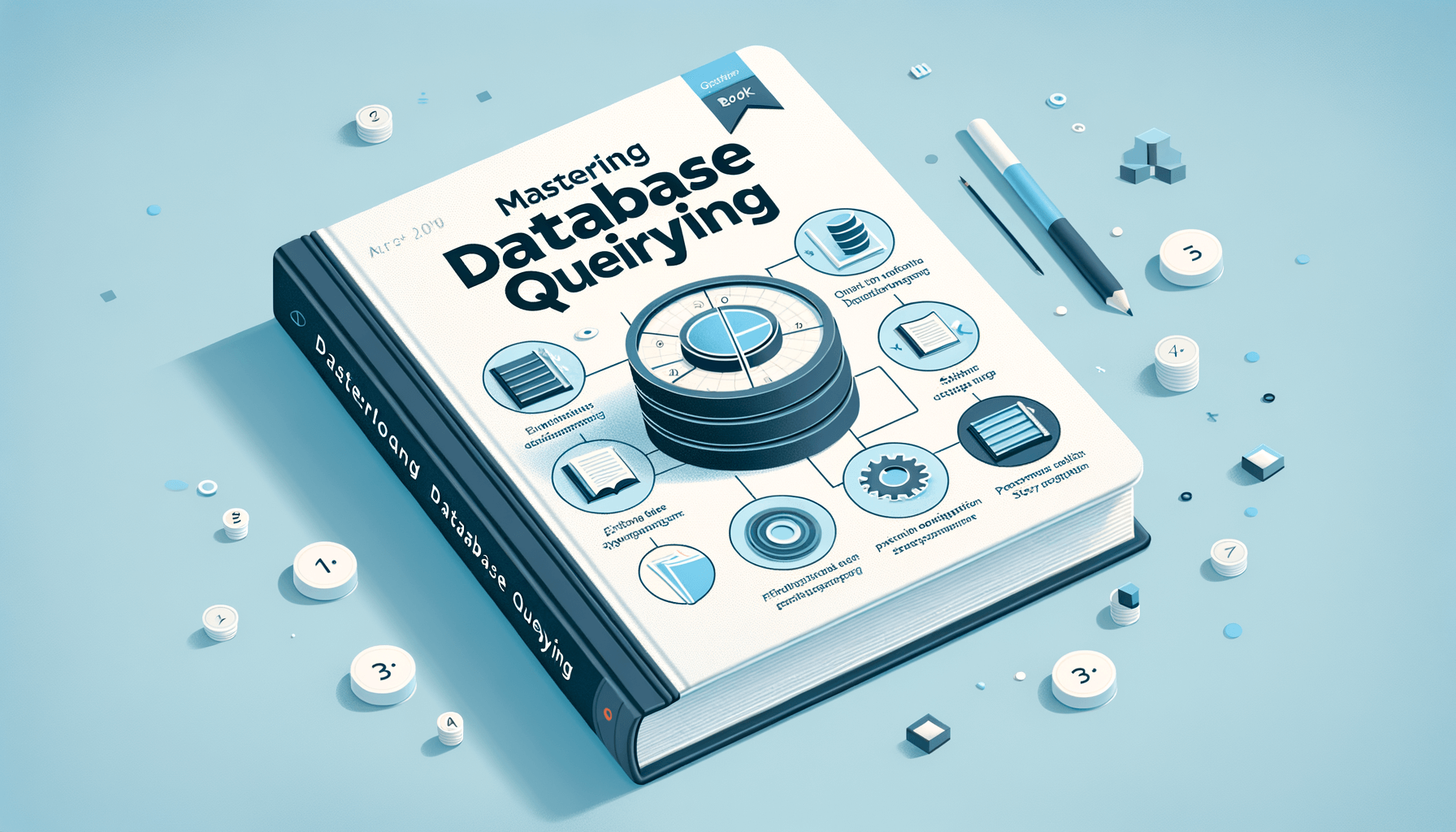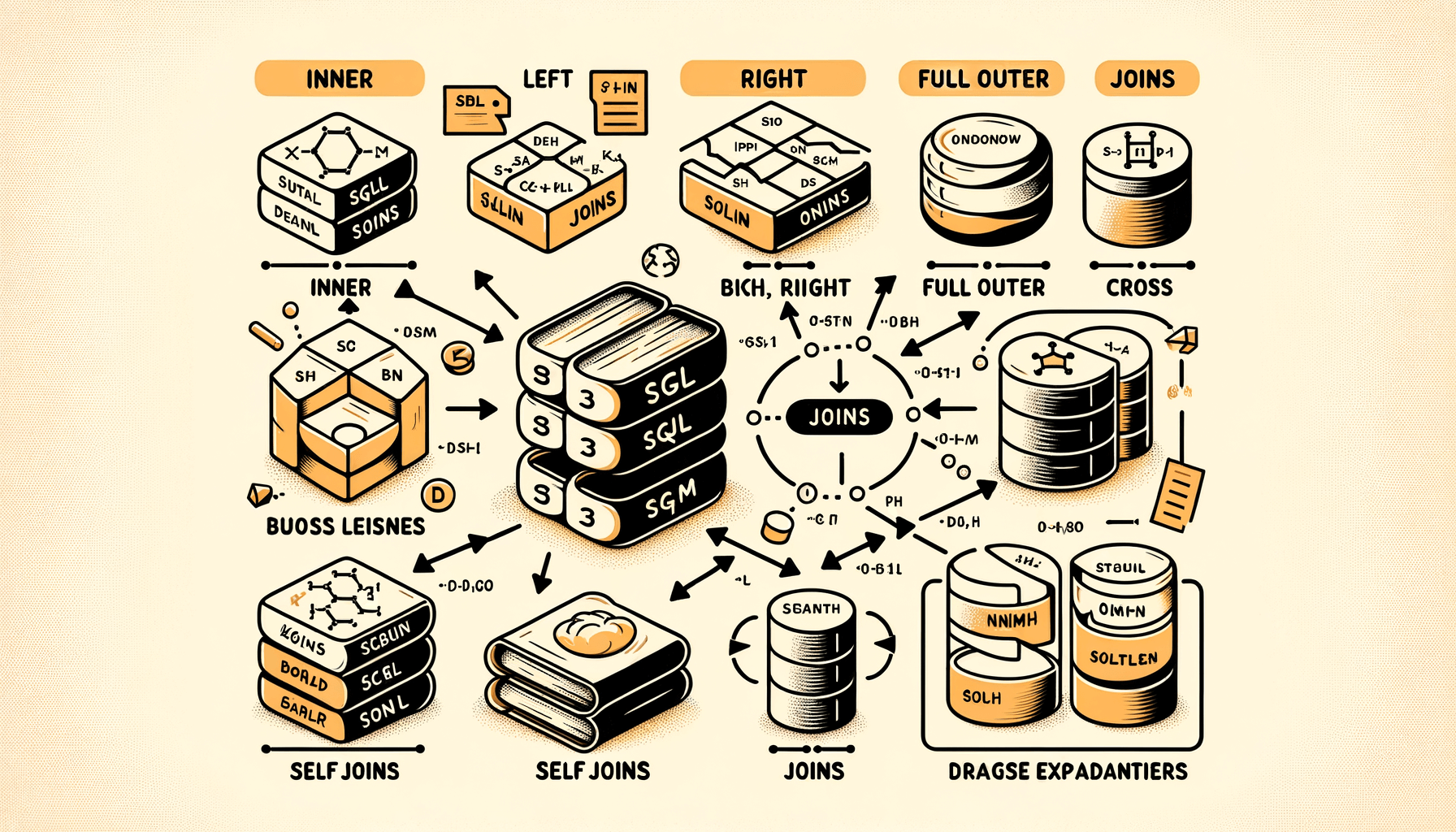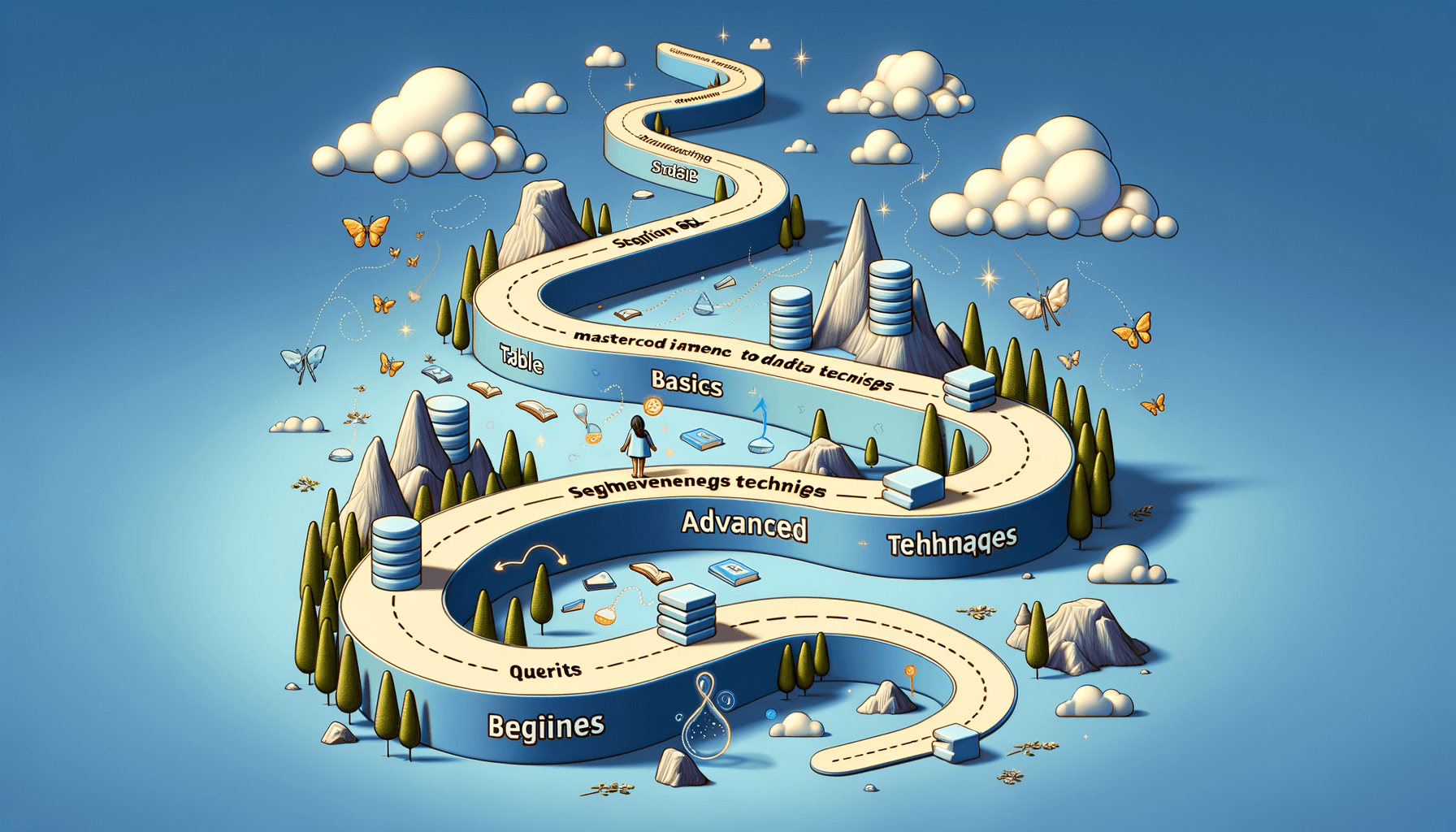A big variety of articles and resources

Mastering Your Career as an SQL Developer: Tips and Strategies
 Sia Author and Instructor
Learn SQL
Sia Author and Instructor
Learn SQL
13 minute read
Becoming a top-notch SQL developer is more than just knowing how to write queries. It involves understanding the role, mastering the tools, and continuously improving your skills. Whether you're just starting or looking to advance your career, this guide will provide you with essential tips and strategies to excel in the field.
Key Takeaways
- Understand the core responsibilities and skills needed for an SQL developer.
- Learn advanced SQL techniques to handle complex queries and optimize performance.
- Master database design principles to create efficient and scalable databases.
- Implement data security measures to ensure compliance and protect sensitive information.
- Develop a professional network and continue your education to stay updated in the field.
Understanding the Role of an SQL Developer
Key Responsibilities and Duties
As an SQL Developer, my main tasks include designing, developing, and maintaining databases. I also write complex queries to retrieve data and ensure the database performs well. Ensuring data integrity and security is another critical part of my job.
Essential Skills and Qualifications
To excel in this role, I need a strong grasp of SQL and database management systems. Familiarity with data modeling and normalization is essential. Additionally, problem-solving skills and attention to detail are crucial.
Career Path and Opportunities
Starting as a junior developer, I can advance to senior roles or specialize in areas like database administration or data analysis. The career path offers various opportunities, including leadership positions and project management roles.
Mastering these skills and responsibilities can significantly enhance my career prospects in SQL development.
Building a Strong Foundation in SQL
Core SQL Concepts
To start, it's crucial to understand the core concepts of SQL. These include data types, basic commands like SELECT, INSERT, UPDATE, and DELETE, and how to use them effectively. Mastering these basics will set the stage for more advanced topics.
Importance of Database Normalization
Database normalization is a method to organize a database into tables and columns. The main goal is to reduce data redundancy and improve data integrity. By following normalization rules, you can ensure your database is efficient and reliable.
Introduction to SQL Joins
SQL joins are used to combine rows from two or more tables based on a related column. Understanding joins, such as INNER JOIN, LEFT JOIN, and RIGHT JOIN, is essential for querying data across multiple tables. This skill is fundamental for any SQL developer.
Advanced SQL Techniques for Developers
Complex Queries and Subqueries
Mastering complex queries and subqueries is essential for any SQL developer. These techniques allow you to retrieve data from multiple tables and perform intricate calculations. Understanding how to write efficient subqueries can significantly enhance your data retrieval capabilities. Here are some key points to consider:
- Use subqueries to break down complex problems into manageable parts.
- Ensure your subqueries are optimized to avoid performance issues.
- Practice writing nested subqueries to handle multi-step data retrieval.
Window Functions and Their Uses
Window functions are powerful tools that allow you to perform calculations across a set of table rows related to the current row. They are particularly useful for running totals, moving averages, and ranking data. Some common window functions include:
- ROW_NUMBER(): Assigns a unique number to each row within a partition.
- RANK(): Provides a rank to each row within a partition, with gaps for ties.
- SUM() OVER(): Calculates a running total.
Optimizing SQL Performance
Optimizing SQL performance is crucial for ensuring that your queries run efficiently, especially as your database grows. Here are some strategies to consider:
- Indexing: Proper indexing can drastically reduce query time.
- Query Refactoring: Simplify complex queries to make them more efficient.
- Use of Execution Plans: Analyze execution plans to identify bottlenecks.
Regularly monitoring and optimizing your SQL queries can lead to significant performance improvements and resource savings.
Mastering Database Design and Architecture
Principles of Database Design
When designing a database, it's crucial to follow certain principles to ensure efficiency and reliability. A well-designed database helps in maintaining data integrity and supports efficient data retrieval. Key principles include:
- Ensuring data consistency
- Reducing redundancy
- Supporting scalability
Entity-Relationship Modeling
Entity-Relationship (ER) modeling is a method used to visually represent the data and its relationships within a database. This technique helps in understanding the data flow and the connections between different data points. An ER model typically includes entities, attributes, and relationships.
By using ER modeling, I can clearly define the structure of the database and how different elements interact with each other.
Implementing Database Schemas
Implementing a database schema involves creating a blueprint for how the database will be structured. This includes defining tables, columns, data types, and constraints. A well-implemented schema ensures that the database is organized and that data can be efficiently accessed and managed.
- Define tables and columns
- Specify data types
- Set up primary and foreign keys
- Implement constraints to maintain data integrity
Mastering these aspects of database design and architecture is essential for any SQL developer looking to build robust and efficient databases.
Data Security and Compliance for SQL Developers
Understanding Data Privacy Laws
As an SQL developer, it's crucial to understand the various data privacy laws that govern how data should be handled. Knowing these laws helps ensure that you are compliant and avoid legal issues. Some key regulations include GDPR in Europe and CCPA in California. These laws dictate how personal data should be collected, stored, and shared.
Implementing Security Best Practices
To keep data secure, you should follow best practices such as encrypting sensitive information, using strong passwords, and regularly updating your software. Here are some steps to follow:
- Encrypt sensitive data both in transit and at rest.
- Use multi-factor authentication to add an extra layer of security.
- Regularly update your database management systems to patch vulnerabilities.
- Implement role-based access control to limit who can access certain data.
Regular Audits and Compliance Checks
Regular audits are essential to ensure that your database systems are secure and compliant with relevant laws. Audits help identify potential security gaps and areas for improvement. Conducting these checks periodically can help you stay ahead of potential threats and maintain a secure environment.
Regular audits not only help in identifying security gaps but also ensure that your systems are up-to-date with the latest compliance requirements.
Effective Use of SQL Tools and Technologies
Popular SQL Development Tools
As an SQL developer, it's crucial to be familiar with a variety of development tools. Popular tools include MySQL Workbench, SQL Server Management Studio (SSMS), and Oracle SQL Developer. These tools help streamline database management and query execution.
Version Control Systems
Using version control systems like Git is essential for tracking changes in your SQL scripts. This practice not only helps in maintaining a history of changes but also facilitates collaboration with other developers.
Integrating SQL with Other Technologies
SQL doesn't operate in isolation. It's often integrated with other technologies like Python, R, and various data visualization tools. This integration enhances the ability to perform complex data analysis and generate insightful reports.
Mastering these tools and technologies can significantly boost your efficiency and effectiveness as an SQL developer.
Optimizing and Troubleshooting SQL Queries
Common Performance Issues
When working with SQL, you might encounter several performance issues. These can include slow query execution, high CPU usage, and excessive memory consumption. Identifying the root cause is the first step in resolving these problems. Often, issues arise from inefficient query design, lack of proper indexing, or suboptimal database schema.
Techniques for Query Optimization
Optimizing SQL queries involves several strategies:
- Indexing: Proper indexing can significantly speed up data retrieval. Use indexes on columns that are frequently used in WHERE clauses.
- Query Refactoring: Simplify complex queries by breaking them into smaller, manageable parts. This can make them easier to optimize.
- *Avoiding Select : Instead of selecting all columns, specify only the ones you need. This reduces the amount of data processed.
- Using Joins Efficiently: Ensure that joins are used appropriately and that the join conditions are optimized.
Tools for Monitoring and Debugging
Several tools can help you monitor and debug SQL queries:
- SQL Profiler: This tool helps you track and analyze SQL Server events, making it easier to identify slow-running queries.
- EXPLAIN Plan: Use this command to understand how your query is executed and identify potential bottlenecks.
- Performance Monitor: This tool provides real-time data on various performance metrics, helping you pinpoint issues quickly.
Regularly monitoring and optimizing your SQL queries can lead to significant performance improvements and a more efficient database system.
Career Development and Networking for SQL Developers
Continuing Education and Certifications
To stay competitive, I always seek out new learning opportunities. Pursuing relevant certifications can significantly boost your career. Courses like SQL MasterClass or SQL Developer Associate Masterclasses are excellent choices. They not only enhance your skills but also make you more attractive to employers.
Building a Professional Network
Networking is crucial in any field, and SQL development is no exception. I attend industry conferences, join online forums, and participate in local meetups. These activities help me stay updated with industry trends and connect with other professionals.
Navigating Job Markets and Opportunities
Understanding the job market is essential for career growth. I regularly check job boards and company websites to stay informed about new opportunities. Additionally, I tailor my resume to highlight my in-demand skills, making it easier to catch the eye of potential employers.
Building a strong professional network and continuously updating your skills are key strategies for advancing your career as an SQL developer.
Real-World Applications of SQL
Case Studies of Successful Projects
In my experience, SQL has been pivotal in numerous successful projects. For instance, in a recent project, we used SQL to streamline data management for a large e-commerce platform. This involved creating efficient queries to handle millions of transactions daily, ensuring data integrity and quick access to information. SQL's versatility allowed us to adapt to various data challenges seamlessly.
Industry-Specific SQL Applications
SQL is not limited to one industry. In healthcare, SQL helps manage patient records and streamline operations. In finance, it is used for transaction processing and risk management. The flexibility of SQL makes it a valuable tool across different sectors, enabling organizations to handle vast amounts of data efficiently.
Future Trends in SQL Development
Looking ahead, SQL is set to evolve with advancements in technology. Integration with big data tools and cloud services is becoming more common, enhancing its capabilities. Additionally, the rise of AI and machine learning is opening new avenues for SQL applications, making it an exciting time to be an SQL developer.
SQL's role in data management is ever-growing, making it an essential skill for developers across various industries.
Leadership and Project Management for SQL Developers
Leading Database Projects
As an SQL developer, leading database projects requires a blend of technical skills and leadership abilities. Effective project management ensures that tasks are completed on time and within budget. I always start by defining clear goals and milestones. This helps in tracking progress and making necessary adjustments along the way.
Effective Communication Skills
Communication is key when managing a team. I make it a point to keep all stakeholders informed about the project's status. Regular meetings and updates help in addressing any issues promptly. Active listening is also crucial, as it allows me to understand the concerns and suggestions of my team members.
Managing Teams and Stakeholders
Managing a team involves more than just assigning tasks. I focus on building a collaborative environment where everyone feels valued. This includes recognizing individual contributions and providing constructive feedback. Additionally, managing stakeholders involves understanding their expectations and keeping them engaged throughout the project.
Leading a team is not just about giving orders; it's about inspiring and guiding your team to achieve common goals.
Preparing for SQL Developer Interviews
Common Interview Questions
When preparing for an SQL developer interview, it's crucial to familiarize yourself with the types of questions you might encounter. Common interview questions often cover a range of topics, from basic SQL queries to more complex database management scenarios. Here are some typical questions:
- What is a primary key?
- How do you optimize a slow query?
- Can you explain the difference between INNER JOIN and LEFT JOIN?
- Describe a situation where you had to troubleshoot a database issue.
Technical Test Preparation
Many SQL developer interviews include a technical test to assess your practical skills. To excel in these tests, practice writing and optimizing SQL queries regularly. Utilize online platforms that offer SQL challenges and exercises. Remember, hands-on experience is invaluable.
Showcasing Your Portfolio
A well-prepared portfolio can set you apart from other candidates. Include examples of your past projects, highlighting your role and the impact of your work. Make sure to showcase any complex queries or database optimizations you have performed. This not only demonstrates your technical skills but also your ability to solve real-world problems.
Preparing for an SQL developer interview involves more than just knowing SQL. It requires a blend of technical knowledge, practical experience, and the ability to communicate your skills effectively.
By focusing on these areas, you'll be well-equipped to impress potential employers and secure your desired role.
Getting ready for an SQL developer interview can be tough, but we're here to help! Our website offers a range of courses and resources to make sure you're fully prepared. From basic SQL to advanced topics, we've got you covered. Don't wait—visit our site today and start your journey to becoming an SQL expert!
Conclusion
Mastering your career as an SQL developer requires a blend of technical skills, practical experience, and continuous learning. By focusing on key areas such as query optimization, database management, and real-world problem-solving, you can enhance your expertise and stay competitive in the field. Remember, the journey to becoming a proficient SQL developer is ongoing, and staying updated with the latest trends and technologies is crucial. With dedication and the right strategies, you can achieve significant success and make a meaningful impact in your career.
Frequently Asked Questions
What does an SQL Developer do?
An SQL Developer designs, implements, and maintains databases. They write SQL queries to retrieve and manipulate data, ensuring data accuracy and security.
What skills are needed to become an SQL Developer?
You need to know SQL, database management, and data modeling. Problem-solving and analytical skills are also important.
How can I start learning SQL?
You can start with online courses, tutorials, and practice databases. Many free and paid resources are available to help you learn SQL from scratch.
What is database normalization?
Database normalization is a process to organize data to reduce redundancy and improve data integrity. It involves dividing a database into tables and defining relationships between them.
Why are SQL Joins important?
SQL Joins allow you to combine data from multiple tables based on related columns. They are crucial for retrieving comprehensive data sets from relational databases.
How can I optimize SQL queries?
You can optimize SQL queries by indexing, avoiding unnecessary columns in SELECT statements, and using joins efficiently. Monitoring and analyzing query performance also helps.
What are some common SQL tools?
Popular SQL tools include MySQL Workbench, SQL Server Management Studio, and PostgreSQL. These tools help in writing, testing, and optimizing SQL queries.
What certifications can help my career as an SQL Developer?
Certifications like Microsoft Certified: Azure Database Administrator, Oracle Database SQL Certified Associate, and others can boost your resume and validate your skills.







